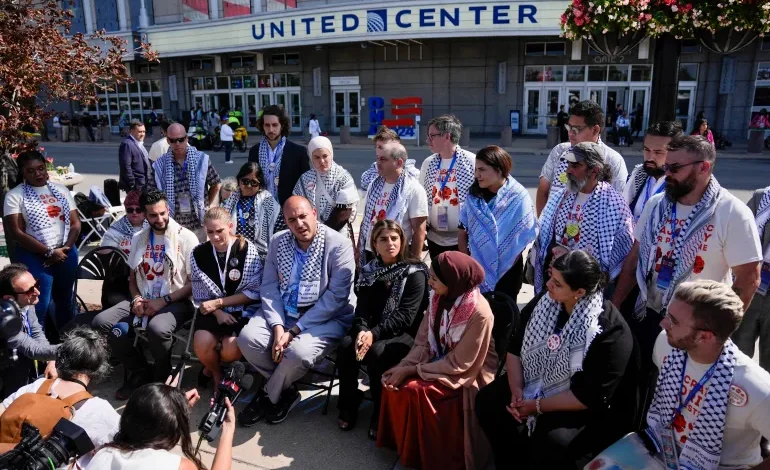‘Sidelining antiwar voices’: US Uncommitted Movement not endorsing Harris

The Uncommitted National Movement, a grassroots effort in the United States that is seeking to pressure the Democratic Party to shift its policy towards Israel amid the Gaza war, says it cannot endorse Kamala Harris for president.
The group said on Thursday that Harris’s team had failed to respond to its request for a meeting with representatives and families of Palestinians killed in the Gaza Strip by a September 15 deadline.
The leaders of the group clarified they were not appealing for voters to check out of the presidential race completely.
Still, political analysts say the nonendorsement could spell trouble for Harris, who needs to turn out a broad base of Democratic voters in an election that is expected to be decided by a razor-thin margin.
It also underscores the alienation of not only Arab and Muslim voters in must-win, battleground states, but also progressive activists with a proven ability to get people to the polls.
Layla Elabed, an uncommitted leader and the sister of Palestinian-American Congresswoman Rashida Tlaib, said the group will not leverage its wide network to mobilise voters for Harris even as they continue to advocate for Palestinians and for other down-ballot issues.
Months of advocacy
Thursday’s announcement is the latest chapter in a months-long campaign that began in the weeks before the Michigan Democratic primary in February.
Democratic voters were urged to go to the polls and select “uncommitted” on their ballots to send a message to Biden, then the presumptive 2024 Democratic nominee, that they were opposed to his staunch support for Israel during the Gaza war.
The effort spread to other primaries – including in the significant Midwestern states of Minnesota and Wisconsin – with a total of 700,000 voters casting uncommitted ballots during the primary season.
However, it remains impossible to know how many did so in protest against Biden’s Israel policy.
The turnout spurred the launch of the Uncommitted National Movement, which eventually sent 30 protest delegates to the Democratic National Convention in August.
The movement’s leaders had expressed cautious optimism in Harris, who took the mantle of the party after Biden dropped out of the race in July. Her selection of Tim Walz – the governor of Minnesota, who had spoken sympathetically about uncommitted voters – also buoyed that hope.
But the group’s request for the Democratic Party to feature a Palestinian American speaker at the convention went unheeded. In outrage, the group staged a sit-in outside the Chicago,
Meanwhile, Harris has repeatedly closed the door on conditioning aid to Israel. The US provides its top Middle East ally with $3.8bn in military assistance annually, and the Biden administration has greenlit additional support during the Gaza war.
Most recently, during a debate with Trump this month, Harris said she “will always give Israel the ability to defend itself”.
‘Entirely disappointed’
It remains unclear what effects Thursday’s announcement will have on the November election.
Recent polls have shown a large percentage of Americans — and Democratic voters in particular — are opposed to continued arms transfers to Israel amid the Gaza war, which has plunged the Palestinian enclave into a humanitarian crisis.
Surveys also have found widespread disenchantment among Arab American voters, a relatively small but significant demographic in key battleground states.
A report released this month by the Council on American-Islamic Relations found support for third-party candidate Jill Stein surpassed support for either Harris or Trump among Muslims in several battleground states.










